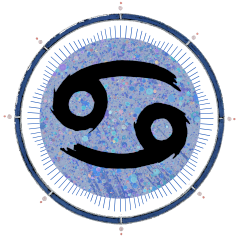Dear Friend and Reader:
In one of my fantasy-fiction experiments, I’m taken back to the summer of 1969 by a character called Fade, a kind of nature sprit who can incarnate as human. She inhabits the East Woods on the Grandmother Land, and she’s been there for quite a long time. The 60s were a particularly fun time for her because there were many tripping, sexually lit-up hippies roaming the woods, and they could catch glimpses of her when she shifted her locus to a low astral plane.
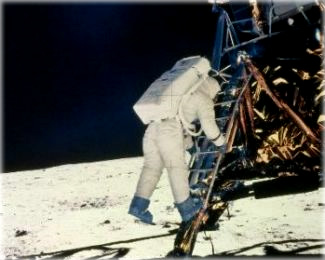
There, I met a young astrologer who, several weeks after the Woodstock festival, was using astrology to figure out how both Woodstock and the Moon landing (and so much else) happened the same summer. Plenty of things in the world make a lot more sense when you connect them to the astrology; nearly simultaneous things happening in different places, connected only by how incredible they are and that they’re all happening on Earth.
I asked her if I could see her chart, which was of course hand-drawn in magnificent calligraphy, and calculated in pencil; back then all astrologers had to learn interpolation, logarithms and other mathematical skills that computers now do in half a wink of the eye. (It takes a bit longer to program those computers, though.)
“I’m sure you’ve noticed the Jupiter-Uranus conjunction had something to do with this,” I said. That conjunction happened in early Libra, less than one degree from opposing the Aries Point.
“Yes, the themes of those planets are beautiful, especially in Libra — like a rush of love. But this conjunction happens every 14 years. It can’t be the whole story. There has to be more.”
“Good call. In 1977, a new planet is going to be discovered. It’s already been photographed about 10 times, going back to 1895. But nobody has noticed it yet. Nobody has seen that it’s in all these pictures. I can tell you where it is right now. I know this chart.”
She handed me a pencil; I would have felt like I was marring someone’s artwork had it been a pen. I sketched in a little key shaped glyph in early Aries, opposite the Moon. “It’s called Chiron and it was discovered by Charles Kowal. This is a planet that will change astrology. It’s a whole new entity in astrology.”
Then I reached into my bag and pulled out a ruffled, home printed monthly ephemeris for Chiron. I considered for a moment how I might be ‘changing the future’ by giving her this and I decided that the worst thing that could happen is that she would become a talented astrologer.
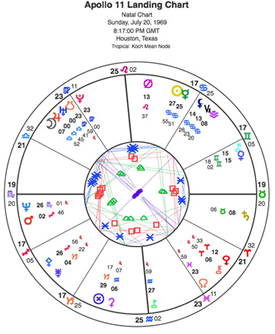 I have grown to thinking of the Apollo 11 landing chart as the chart that proves astrology. While it’s true that there are things about the chart that I can’t understand, that is, I don’t get the symbolism of, that’s often the case, and it’s part of the fun of astrology. Charts for important world events have a way of unfolding over years; they are esoteric devices and don’t give up their secrets all at once.
I have grown to thinking of the Apollo 11 landing chart as the chart that proves astrology. While it’s true that there are things about the chart that I can’t understand, that is, I don’t get the symbolism of, that’s often the case, and it’s part of the fun of astrology. Charts for important world events have a way of unfolding over years; they are esoteric devices and don’t give up their secrets all at once.
However, there is so much that is so much fun. Here are some defining features. You will need to find them in the chart yourself. Click on this legend, and translate my words into the chart; it’s easy.
Jupiter conjunct Uranus, in Libra, gleaming in full glory, looking right at the Aries Point. This one conjunction has several layers; the first is that it represents a 14-year cycle between two of the most expressive and dynamic planets; big ones, too. Jupiter is about wisdom, expansion, far journeys and foreign lands. Uranus is the forward-thinking, Promethian influence of sudden leaps ahead, inventions, innovative concepts and technology. Straight away we have a chart that says, “Humankind leaves Earth and goes to another planet for the first time.”
Libra is the piece that invokes relationships; looking back at ourselves from the ground somewhere else; getting there in the first place with our child-like technology, basically proving the notion that someone else can visit us; the feeling, in true Aries Point style, that we are all in this together.
Chiron in Aries. At the time of the Moon landing, Chiron (though undiscovered at the time) was making a long opposition to Uranus. Most of us born in the 1950s into the early 1970s have this aspect; and it appears prominently in the Moon landing chart, due to its Aries Point presence, as well as Jupiter’s involvement. Chiron in Aries is ultimate search for self (associated with what was at the time called the Me Generation); retrograde, a self (or a search) so deep we can barely fathom it. It could be a truly ancient injury to our identity; something akin to the ‘separation’ concept in A Course in Miracles; the idea that we have forgotten who we are and forgotten our source, but we still have access to it if we delve deeply enough. Obviously through this momentous effort we are trying to heal something within ourselves, and in truth we may have. I think there are world events that push us to take up a new concept of who we are; where our idea of who we are must expand in the face of what we have witnessed. The Moon in Libra is opposite Chiron in the chart for the first steps on the Moon. This is really too beautiful for words.
The Aries Point. I can think of no better chart that describes the Aries Point as a multiplier of experience, and of being involved with something enormous that touches each person so individually. Neil Armstrong said it beautifully, “One small step for a man; one giant leap for mankind.” The contact point, in astrology, is the Aries Point, and here we had it Libra-styled; relational; and done with elegance and beauty.
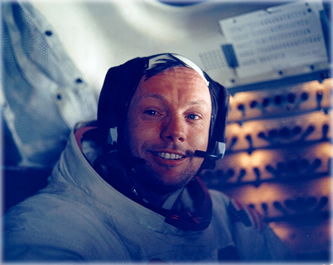
Many planets in the 11th house, in particular all those Libra ones; and some Virgo; in the house of ‘all of us here’. This is the house of the collective, and of collective benefits, mutually, between people and society. We have all profited from the space program in ways that we are reading on right now.
The Sun and Mercury in Cancer, 9th house. This looks like a collective spiritual awakening; and a long trip to somewhere such as Mecca. Though in theory this mission had nothing to do with religion (a 9th house theme), it did something to humanity as a whole in terms of opening a conscious door to higher consciousness (another 9th house theme) and it was certainly as far as we’ve traveled in quite a long time (9th house again). I know that plenty of bad things happened in the years after the Moon landing; world peace did not ensue. But a lot of growth and progress did.
Scorpio rising, Neptune in the 1st house. This has some penetrating power; it is deep and trippy in that Ram Dass kind of way; it’s another symbol of transformation, related to the 9th house in that there is an esoteric connection between the sign Cancer and the planet Neptune. To have Neptune rising speaks of the invisible, internalized and difficult to discern nature of the real effects of this event. It’s also cannon fodder for conspiracy lovers, because Neptune rising could imply or impart the feeling that the whole thing is fake. Intuitively, I never thought it was; yet I’ve yet to see one bit of documentation that would lead my thinking that way. I also enjoyed a recent episode of Mythbusters that took on several of the factual issues of the ‘NASA faked it’ contingent; none of them held up.
While we’re on the topic of the 1st house, note that Mars is in Sagittarius in the 1st house, imparting the feeling of unmitigated determination that it took to get this job done.
Venus conjunct Nessus. I don’t understand this one; a straight reading would say this suggests the event described was not so good for women; it would suggest a potential violation of the feminine principle; the whole thing could be the result of a woman’s actions, somewhere deep in its hidden history. Gemini implies that there are several aspects to the story. Neptune is about consequences and how they got to be that way. With Venus ruling all that Libra as well as the 7th cusp, there is something implied in a relationship. And while we do indeed rightly extol the glory to humanity for making this thing happen, and our blessing of being alive at or near the time it happened, there are hidden results that we will need to process for a long time, and would be wise to consider before we go to another planet, or back to the Moon.
Yours & truly,
![]()
A Rocket Man Remembers:
Dr. Lou Povinelli of NASA’s Apollo Program
By Eric Francis | Dogtown Writer
This week’s 40th anniversary of the Moon landing, mankind’s “one giant leap” and the signal technological achievement to that point, offers up a reminder: Sometimes what you’re doing is rocket science.
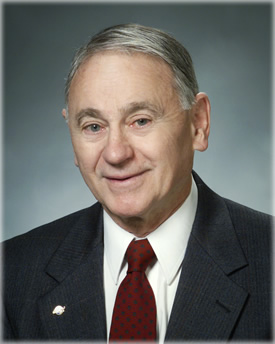
During the 1960s, that’s exactly what Dr. Lou Povinelli was doing. He was a rocket propulsion system engineer, and one of the tens of thousands of NASA employees (supported by hundreds of thousands of contractors) who worked to make the Project Apollo program a success. Today he is a senior technologist and member of the executive corps at NASA, working at the John H. Glenn Research Center in Cleveland, Ohio.
“When I came to NASA and I look back at what I had done before I came here, it seemed like a perfect fit,” said Dr. Povinelli. “There is an outstanding group of engineers that work for NASA and I think they all take pride in their work — exceptionally good people, well suited and well talented to carry out these missions.”
Being a rocket scientist, it hardly needs saying, takes a bit of schooling — 11 years of college, in Dr. Povinelli’s case.
He started with two years at Canisius College in Buffalo for a pre-engineering degree, followed by a bachelor’s degree in mechanical engineering after three years at the University of Detroit. Then he was off to the University of Kentucky for two years, where he secured a master’s in mechanical engineering. His Ph.D. in mechanical and astronautical engineering took three years at Northwestern University, after which he was awarded a prestigious Fulbright postdoctoral fellowship at the Polytechnic Institute of Turin, Italy, which ended in 1960.
“About that time, I figured I needed to make some money,” he said, then added with a chuckle, “So did my wife!”
He and Jean had been married the year before — they now have seven children and five grandchildren, and celebrated their 50th anniversary this year.
Dr. Povinelli found not just a paying job but a lifelong career when he signed on with NASA and started working at the Lewis Research Center (now named for former astronaut and U.S. Sen. John Glenn) in Cleveland on Nov. 1, 1960, just before Kennedy took office.
His interest in rocket propulsion had developed during his college years in Detroit’s cooperative program, where he alternated study with working at Bell Aircraft Corp. in Niagara, N.Y.
“I interned in the rocket engine lab, along with a few other assignments, and met some of the Germans who had been working at Peenemünde [during World War II] developing the V1 and V2 systems,” he said. “It was an era of excitement for a young 19-, 20-year-old, being able to work and listen to their stories [of the] efforts they had gone through in developing those weapons systems.”
Captured or expatriate German scientists — most notably Wernher von Braun — played a vital role in the American space program, and working with them galvanized Povinelli’s interest in the field. Once he was on board at NASA and President John F. Kennedy announced the goal of a manned Moon landing, he and his colleagues suddenly found themselves with a crucial role in the Apollo program.
“I fell into this group of rocketeers and research engineers working on rocket propulsion, solid and liquid propellants, studying the aspect of the combustion process that would give us a nice, stable environment in the chamber,” he said. “Certainly we recognized the importance of the work we were doing in terms of making the mission successful.
The last thing we wanted to do was be some of the researcher guys working on some element of the system that exploded.”
While there was public excitement over the prospect of the Moon shot, Dr. Povinelli says even those who knew he worked at NASA sometimes found the nature of his contribution hard to fully comprehend.
“You have to realize, the general public didn’t have much of a concept of the engineering that was required to make the [Apollo] system work,” he said. “To their minds, rockets… the Germans [had done] that, you ought to be able to do that, no problem.
“So I didn’t see a whole lot of that [excitement],” he said. “It was more, ‘You’re a rocket scientist, I could never understand that stuff.’ Sure you can! You just squirt fuel and oxidizer together and light it and make sure you don’t blow it up!”
But there was a feeling of “awe and excitement as to whether we could pull it off” that spilled over into the general public, recalled Dr. Povinelli.
By the time Apollo 11 blasted off on July 16, 1969, most of the important work by Dr. Povinelli and his colleagues was already done.
“We had perhaps some six to eight years to build up in that very intense mode,” he remembered. “I think we had a lot of confidence the systems would work right. We had actual flight and knew that astronauts could return safely.”
But that didn’t make watching the first Moon landing any less special to him.
“It was very late at night, as I recall, around 11 or 12 o’clock,” Dr. Povinelli said. “My wife and I and four or five of our children were sitting in front of the TV set in this suburb of Cleveland, watching very anxiously as [Neil Armstrong] descended down the ladder and put his foot on the ground.
“I must say, there was a great sense of relief,” he said, “but there was a tremendous feeling of pride for the small part I had and that the group had played in making this a successful mission. In my mind, this was probably one of the greatest engineering achievements we’d ever carried out on Earth. There was just a fulfillment of that [potential] that filled me with tremendous admiration, not only for the astronauts who were up there willing to risk their lives, but also the NASA engineers and contractors who performed so well.”
Dr. Povinelli paused before summing up his feelings on that day: “You get to play a small part in a big drama, and it does move you quite a bit.”
In total, astronauts would visit the moon five times, the last being in 1972, and the Apollo program would wind down in 1975. Dr. Povinelli moved on to other projects at NASA dealing with propulsion concepts; today he is working on ways to make supersonic commercial flight practical. In February, he and four other executives at the Glenn Research Center received the Presidential Rank Award from President Obama, recognizing commitment to excellence in public service.
Through his work on the supersonic airplane project, Dr. Povinelli is also involved in designing a descent and landing system for an eventual manned Mars mission. The main challenge? Momentum. A spacecraft capable of supporting human life during the long trip between the planets would have to be 100 times the size those that delivered the two Mars Rovers, he said, and would be traveling at more than 20 times the speed of sound when it reaches the red planet’s atmosphere.
“It has to slow from Mach 22 to Mach 0 within the atmosphere of Mars,” he explained. “[We have to determine] how we slow that [spacecraft] down to a velocity where it doesn’t blast itself into the ground 50 feet deep on Mars.”
So, would Dr. Povinelli like to see astronauts return to the Moon? He hardly has to think before answering that question in the affirmative — and with a broader agenda than just stopping by for a visit.
“This time would require something above and beyond what we did before,” he said. “To maybe establish some sort of temporary residence up there to stay for a bit of time, rather than a very short visit. With some objectives that will necessarily have to fall in line with what the nation or the world is really trying to address at this stage of civilization.”
And while he’s seen the level of interest in the space program drop among both young and old, there are still those out there who dream of going to the Moon — or to Mars, in the case of one 15-year-old in his neighborhood. And Dr. Povinelli continues to try and help people understand just what it takes to reach those goals, no matter how complex they may seem.
“My next-door neighbor will introduce me to a friend: ‘Lou works at NASA; he’s a rocket scientist,'” he said with a chuckle. “I try to convince them it’s not so complicated anymore.”
Aussie Finds a New Hole in Jupiter
How often does something the size of Earth show up unexpectedly in the Solar System?
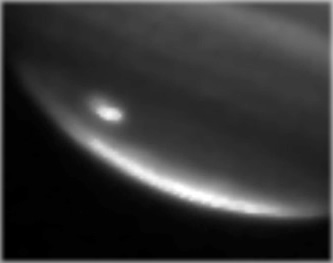
Not very, for sure. But this past Monday, July 20 — on the 40th anniversary of the Apollo 11 Moon landing, no less — a backyard astrologer in Australia apparently was the first person on Earth to notice something new about Jupiter.
There was a hole in its atmosphere. A really big one. Emphasis on “really.”
As reported in this New York Times article, Anthony Wesley was having a look around the night sky above his home north of Canberra, Australia, with his telescope — a serious model as tall as a man with a 14.5-inch reflecting mirror — when he noticed something odd about Jupiter.
There was a big hole near its south pole. Big enough to hold this very planet we’re standing on.
After verifying through observation that it wasn’t a storm or the shadow from one of Jupiter’s Moons, Wesley contacted some folks who he felt could get an even better view of it: NASA. Boy, did they.
NASA’s experts were quick to verify Wesley’s sighting and give him credit where it was due. There’s been a fair amount of speculation as to what could have caused the phenomenon — perhaps a comet struck Jupiter, as happened with comet Shoemaker-Levy in 1994 — but it is possible no concrete answer will be found.
Still, noted Jet Propulsion Laboratory scientist Leigh Fletcher, it was the kind of discovery stargazers often wish they could make.
“Given the rarity of these events, it’s extremely exciting to be involved in these observations,” Fletcher said in a NASA release. “These are the most exciting observations I’ve seen in my five years of observing the outer planets!”
For his part, Wesley told the Sydney Morning Herald, he came away with an appreciation of the role gas giant planets play in Earth’s cosmic safety.
“If anything like that had hit the Earth it would have been curtains for us,” he said, “so we can feel very happy that Jupiter is doing its vacuum-cleaner job and hoovering up all these large pieces before they come for us.”
Europe and Asia get Nighttime Treats
It’s been a good week for spectacular nighttime displays in Europe and Asia, and the nice people who contribute to Space Weather were all over it.
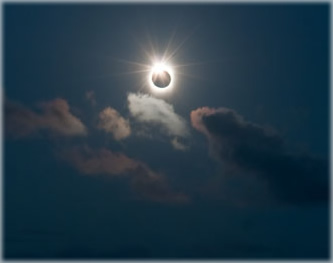
Naturally, there was the July 22 total solar eclipse over India and China — the longest one of this century. Donald Gardner, a Space Weather correspondent in the Chinese city of Huangshan, reported: “The temperature dropped from 96.6F to 88.5F at totality. The roosters were crowing and the streetlights came on!” He also took the spectacular photo at the link above.
Back east in Europe, where the eclipse wasn’t on full display, Tomasz Adam of Staszów, Poland, reported that there was plenty to see, anyway, as he demonstrated with his photo of noctilucent (“night shining”) clouds. “While India and China were enjoying a total solar eclipse, here in Europe we were treated to a sky show of our own,” he wrote. “It was easily the best display I’ve ever seen.”
Similar noctilucent clouds made their presence known in Merry Olde England earlier this month. On June 16, Space Weather published a fabulous photo by Grant Privett of glowing clouds over Stonehenge, one of man’s most important astrological calendars.

Special Edition for Friday, July 24, 2009, #776 – BY ERIC FRANCIS
 Aries (March 20-April 19)
Aries (March 20-April 19)
The Sun and other planets are crossing one of the most fired-up angles of your solar chart — Leo, your solar 5th house. The 5th has a reckless feeling to it; once is never enough, nothing is ever dangerous and your tendency to take pride in your boldness can shine out. There’s just one issue: you seem reluctant to express yourself because you’re worried about how someone, it looks like your father, will perceive you. If it’s not your father, it’s a relationship in which you feel you have to prove something. To say this is a delusion would be to oversimplify the case, but not to understate it. Check if you’re trying to have it two ways: to live authentically, and to demonstrate that deep down you’re worthy of approval because you’re so pure.
 Taurus (April 19- May 20)
Taurus (April 19- May 20)
It’s like old home week: a visit to the ancient past, and to the root of the influences that have guided you to become who you are. Guided is one thing; lashed to a board is another. Your visit to the past has arrived as a reminder: you can indeed identify and let go of what influences you don’t want. Currently the problem is you may be too close to it to see it for what it really is; to see the influences of your early childhood for what they are, sufficient to envision that something different is possible. And what that different experience would be remains to be seen: but I think it would start with exploring forms of diversity that simply did not exist anywhere in your past — anywhere but you, that is.
 Gemini (May 20- June 21)
Gemini (May 20- June 21)
Your charming side is coming out lately, though I keep wondering — is that a switchblade in your pocket, or are you just happy to see me? It’s probably best if you keep it there. You know you have it if you need it. Yet in truth you don’t need this or any other sharp tool — only to tune into the side of yourself who is in tune with who you are. To the extent you recognize conflict as an inner phenomenon that then gets dramatized in the world, your life will be simpler and easier. Your tendency may be to do precisely the opposite, which would be to think you’re taking on the tension in your environment. Just check carefully what is what before you make any accusations, or try to defend yourself.
 Cancer (June 21- July 22)
Cancer (June 21- July 22)
Your power comes from your sense of self-worth, just like energy flows out of a battery. And like a battery, you need to be charged up. It’s difficult for you to feel or measure this energy when you’re using your emotions to evaluate. You’re going to need the involvement of your mind. The question is whether that alone can serve to build your confidence, and I would say: perhaps a little, but only to the point where you make some moves that gain you the sense of presence in the world that you seek. You may be inclined to feel that you tried recently, and failed. That is part of the process. At the moment you have the pluck to try again, and again, and probably a third time or more. That sounds like a plan.
 Leo (July 22- Aug. 23)
Leo (July 22- Aug. 23)
You’ve lived a lifetime this week; you’ll live another through this birthday season, particularly building up to the lunar eclipse of early August. It may seem like you’re shedding so many aspects of yourself, with corresponding changes in your relationships. After the past six months of curves and loops, this is obviously an understatement. Yet there is something you know you need to give up — something that you don’t need and in truth don’t want. The question is why you think you would want it; that’s most likely a matter of emotional attachment, and it does seem to be an impressively old bit of clinging. Making a choice is only a matter of applying your perception. This promises to be a lot easier now than it’s been lately.
 Virgo (Aug. 23- Sep. 22)
Virgo (Aug. 23- Sep. 22)
You’ve slipped into another dimension; this, rather suddenly. The world is simpler, your feelings are clearer, and best of all, you understand yourself. You may be asking why you can’t feel this way all the time. One possibility is that you’re too dependent on logic, or at least a certain kind of logic that you use to compare yourself to others. You gain freedom when you cease the comparisons; when you determine that you stand on your own, and that your intelligence and creativity can be judged on their own merits rather than in contrast to people and things to which you’re actually incomparable. What you’re feeling right now is freedom, spurred by reverence for the unknown; that is, for what you don’t know about yourself yet.
 Libra (Sep. 22 – Oct. 23)
Libra (Sep. 22 – Oct. 23)
If someone asked whether you need to be the center of attention, you would probably say no, and most of your friends would agree. But when we observe your life, you handle the spotlight well; in fact, you’re at your most creative when you know that others are looking at you and the works that come from your heart and hands. This is about where we find you today. You have opportunities to send your message; express your talent; develop yourself in ways that are both authentic and creative. These opportunities may not have been available or seemed as valuable just a few days ago. They qualify as both of these things today.
 Scorpio (Oct. 23- Nov. 22)
Scorpio (Oct. 23- Nov. 22)
Life is easier when you’re not carting around the emotional baggage of other people; it’s easier when you set your own goals rather than eliminating the things you aspire to because you’re certain that someone will disapprove. We don’t see how subtle this is: and if you can see, you can step outside of it. If you can take at least one bold step, you might be able to break from the tractor beam of someone else’s doubt — and that is precisely what it is. Straight away, you’re in a position to discover that there is another side to the story. Yet you may still be struggling with feeling confident and secure with this cord cut; keep working on the attachment issues involved. The forthcoming Aquarius lunar eclipse will help you clear up any residual dust and grime.
 Sagittarius (Nov. 22 – Dec. 22)
Sagittarius (Nov. 22 – Dec. 22)
For the first time in months, planets are gathered in a fire sign. Yet it seems like your mind is teetering between being driven by passion and being guided by logic and ingenuity. While the two don’t contradict, it has been the passion piece that has been missing; you have not been lacking ideas or for reasons to try them. So take a ride on the tiger. One of the best qualities you have access to is an expanded sense of faith in your abilities. This same faith is opening your perspective on what is possible. You are, at the moment, less dependent on others for your sense of what you can achieve. Your perspective is the one that counts the most, and you know it: a bigger step than you might imagine.
 Capricorn (Dec. 22- Jan. 20)
Capricorn (Dec. 22- Jan. 20)
Will the world ever change? Think of how challenging it is for an individual to change, multiply it by six billion and you have one possible answer. However, that being said, you are performing some impressive feats of progress. Among other things, you are redesigning your relationship to the past. It has less power, for one thing, and it seems more like a resource than a museum where you can’t touch anything. Perhaps the biggest problem with the world is that everyone seems to have their eyes on the back of their head. Humans tend to look in the direction of what was, and away from who and what is standing right in front of them. Try looking straight ahead: I think you’ll like what you see.
 Aquarius (Jan. 20- Feb. 19)
Aquarius (Jan. 20- Feb. 19)
I don’t blame you for being uneasy. You rightly sense that a lot is about to change, and that you’re about to change, but it’s difficult to say when, or how, or even why. Yet why is the easiest of these questions to answer: it’s time. That implies ‘when’, which would be right around now. The only thing standing between you and some of the most incredible progress of your life is fear of the thing you say you love the most: people. I would never suggest that your fear is frivolous. People can be treacherous, and they often aspire to making this an art form. However you have yet to fully identify the ways in which your own fear magnetizes certain kinds of people to you; and you tend to forget how transparent people’s agendas are. When you meet someone and you’re busy sizing up how cute they are or aren’t, listen for their agenda. Use what you find out.
 Pisces (Feb. 19- March 20)
Pisces (Feb. 19- March 20)
I’ve been noticing how sensitive I am to the background music in the cafes where I write this column. I always get the feeling that I’m conveying the music into the words that I write; for this reason, I’ve had to stop writing one particular place because I don’t want to vibe Frank Sinatra in your direction. This may be a Pisces thing, particularly with an eclipse in your sensitive 12th solar house approaching fast. All in all, your sensitivity to the background is going up. I suggest you take control of your environment, particularly the parts of it that you can’t see but that you can smell, hear and feel. I suggest you do a round of cleaning, remove any irritating factors you can get rid of, ritually fill a garbage bag, and get some help from someone who knows Feng Shui. If moving your bed six inches can make you happier, definitely move the bed.



